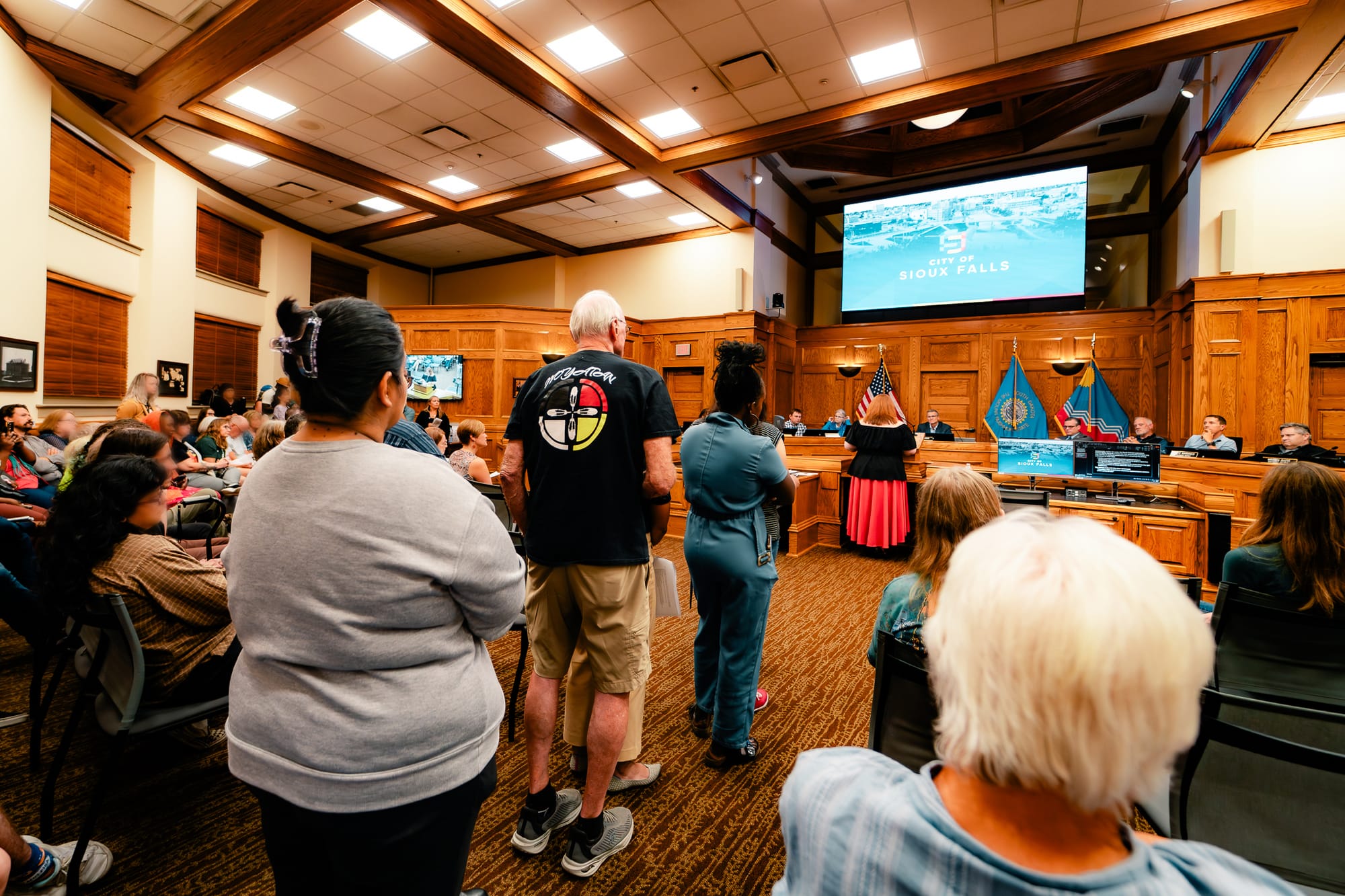Simplified: Mayor Paul TenHaken and the eight-member city council heard from dozens of people opposing Gov. Larry Rhoden's new "Operation Prairie Thunder" – which offers state support to U.S. Immigration and Customs Enforcement (ICE) – in a standing-room-only meeting Wednesday evening. But councilors and the mayor say their hands are tied when it comes to interfering with the governor's orders.
Why it matters
- TenHaken, as well as Police Chief Jon Thum stood alongside Rhoden in a press conference last week announcing Operation Prairie Thunder as a "comprehensive, targeted public safety initiative to protect South Dakotans," as Rhoden put it.
- Essentially, the two-part operation offers state highway patrol support for crime and drug enforcement via saturation patrols in Sioux Falls. Additionally, it'll offer highway patrol, national guard and state Department of Corrections support to ICE deportation efforts.
- It's the second part of the operation that spurred a flood of calls, emails and public comment from residents – many of whom shared powerful testimony about the fear this statewide effort creates, especially among the immigrant community and for people of color living in Sioux Falls.
"We are not criminals," said resident Sandra Ansua Fischer. "We are not rapists. We are not drug dealers. We are your neighbors. ... We are a part of the fabric of this city, and please stand with us."
- TenHaken said his office had nothing to do with the additional state support for ICE, and he's maintained that there's not really anything he or the city can do to stop it. State law prohibits sanctuary cities or any policies that go against deportation efforts. Though, TenHaken noted he'll pass along the comments the city has received opposing Operation Prairie Thunder.
"There’s a lot more that I wish we could share," TenHaken said during Wednesday's meeting. "Sometimes you maybe show up, and you don't have all the information at a press conference – let's just say that. ... As much as I can say, 'Stop this,' it's going to happen."
Is it true the city can't do anything?
Yes and no.
It's true that the city can't defy state or federal law, according to comments from TenHaken.
But what several commenters in Wednesday's meeting noted is that the mayor and council have, at the very least, fewer degrees of separation to the governor than the average citizen.
"I know a lot of the issues surrounding ICE and Operation Prairie Thunder is beyond your control, but you guys do have a platform that can speak to the stories of a lot of people over here," said Zak Okuwe.
The call from many speakers was for the mayor and council to simply speak up.
"Did you fight for us mayor, when the governor approached you with this?" immigration attorney and SD Voices for Peace CEO Taneeza Islam said. "Did you fight for the communities that are here today to protect them from the overreach of ICE enforcement and the militarization of our city?"
Resident Jennifer Weiss echoed this sentiment.
"If you as the mayor and the city council of Sioux Falls are impotent to protect the residents of Sioux Falls, who can protect our city?" she said. "If not you, then who?"
What did the councilors have to say?
Sioux Falls Simplified reached out to all eight councilors following Wednesday's meeting to ask them if the community testimony had spurred them to take any sort of action.
- Largely, the response was deep concern for the residents of the city who are feeling unsafe paired with a feeling of inability to do anything to help.
"The City of Sioux Falls can't tell the State of South Dakota to go to hell," Councilor Curt Soehl said, noting that he was impressed by the speakers who came forward. "We've all gotta stay in our lanes with that thing."
Councilor Richard Thomason said he also appreciates all of the feedback and those who came forward to speak. He said he plans to share that testimony with colleagues in Pierre.
"But again, our hands are tied on certain actions that we can take," Thomason said. "What we can do in terms of action – it's just limited."
Councilor David Barranco said it's the role of the city to communicate what's going on, dispel myths, understand facts, hold government accountable and make sure the law is "scrupulously observed."
"One point I found particularly resonant: there’s a difference between being safe and feeling safe," Barranco said. "It’s not enough for me to reassure residents, 'don’t worry.'"
What happens next?
Councilors are working together and with the city attorney to figure out if there's anything they can do, Councilor Ryan Spellerberg said, adding that he was "on the edge of (his) seat" hearing testimony Wednesday night.
"We're getting your emails," Councilor Miranda Basye said. "We're hearing your phone calls. We're asking the city attorney. We're trying to peel back the layers and understand this and understand what place does the City Council have in this."


